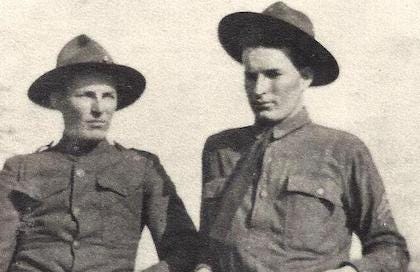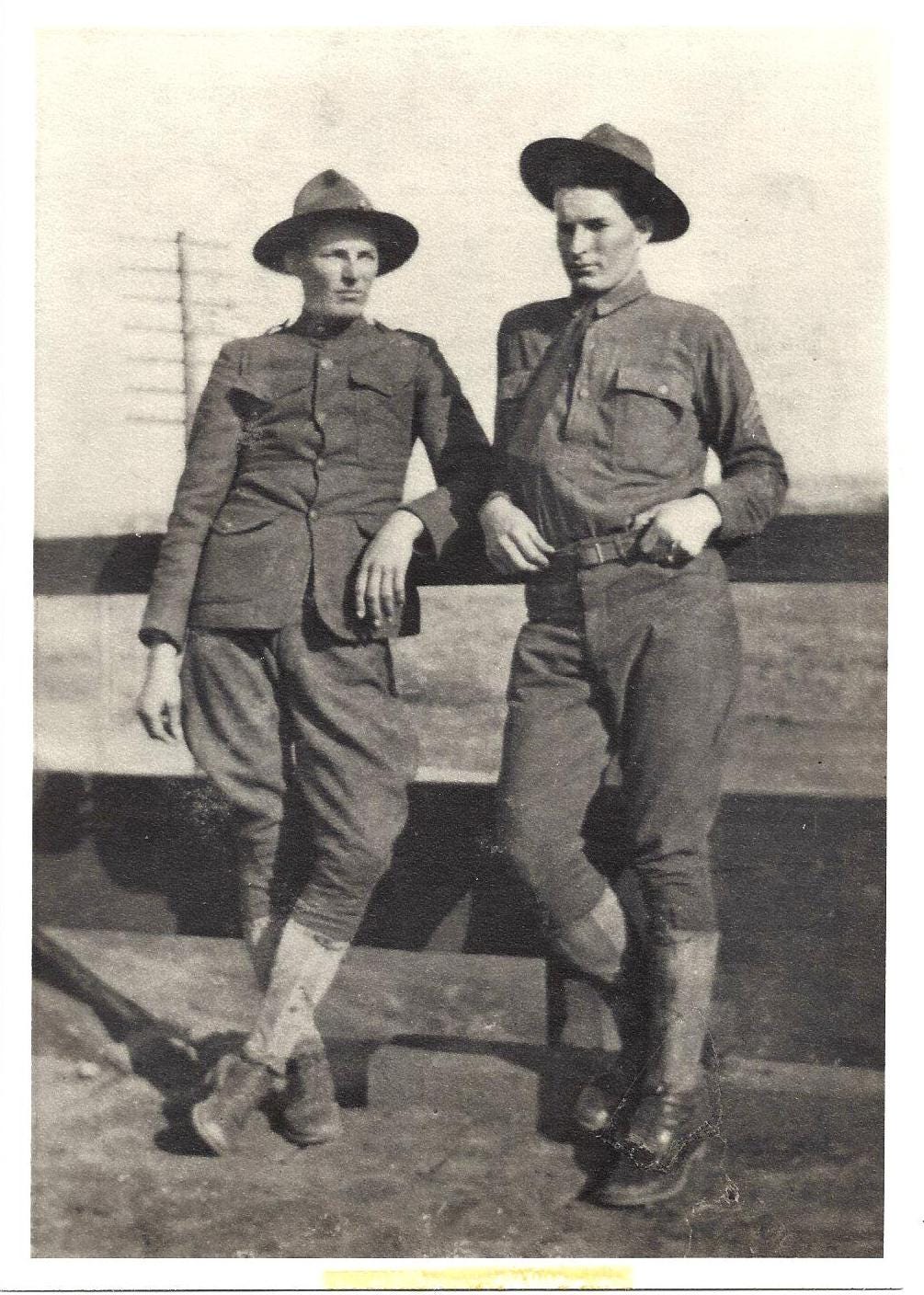In basic training for the "War to End All Wars"
Issue #2: Paul Green's Cabin from his diary, July-December 1917
This month we offer portions of the earliest entries from playwright Paul Green’s unpublished diaries. He enrolled as a student at the University of North Carolina in September of 1916, and after a successful year of study, he felt compelled to enlist in the Army—Company B of the 105th Engineers—to do his part for President Woodrow Wilson’s “war to end all wars.” Green’s first posting as a soldier was in Goldsboro, North Carolina, before his company was sent to help build a new military base outside Charlotte.
In these passages, the aspiring writer is already testing his powers. Sometimes the prose is arch and overdrawn, but Green’s keen eye for his natural surroundings and his curiosity about the behavior of human beings are alive in his words. Many themes that would come up throughout his lifelong diary are here—his frustration with organized religion (specifically Christianity), his empathy for traditional women’s work, his tendency toward depression, and his discomfort and paralysis in witnessing racial violence perpetrated on African Americans.
In this year of basic training, Green was writing poetry, reading voraciously, and helping in the distribution of supplies at Camp Greene. In October, he was transferred to Camp Sevier in South Carolina, as the inevitability of the trenches in Europe came ever nearer. Green was trained in the hazards of mustard gas, a favored German weapon in WWI, and he steeled himself to the possibility of his own death. He sought publication for a volume of poems before his journey by ship to the battlefields across the Atlantic.
In the next edition of Paul Green’s Cabin, the diary excerpts describe the future playwright’s journey to France and Belgium and the horrors of war. Please subscribe here.
Wednesday, July 25th, 1917
Was awakened in the early dawn by the reveille call. The bright, lively notes, the smell of the fresh morning air, the gray forms of the soldiers moving about in the semi-twilight impressed me with the sense of something beautiful, and a feeling of exhilaration possessed me. We rapidly assembled in double file, facing the Captain. Then we were marched outside the camp ground upon a public highway nearby, and took our morning exercise. At 7:30 we had breakfast. And such a method of eating! The men stand in line and march by with their mess kits.
After breakfast at 7:30 we were sent out for drill service….We drilled 4 1/2 hours that morning and in the afternoon 2 1/2, beginning at 2:00 and coming in at 4:30.
My whole soul revolts at this kind of living. The want of honor among many of the soldiers, their ceaseless vulgarity and profanity are hateful in the greatest degree. What pleasure can there be in such a life.
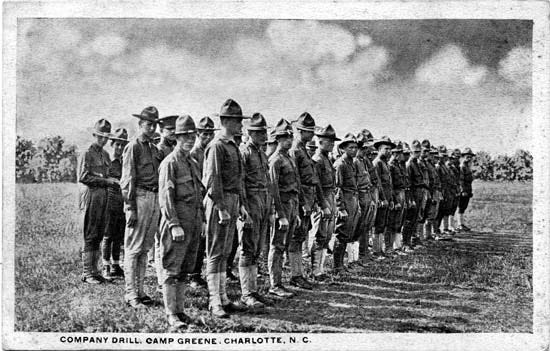
Tuesday, July 26th
I learned many things today that were surprising. The men are ceaseless cigarette smokers. 99% of the men in the Company smoke. I should say that the average per man is twenty cigarettes a day. Multiply this by the 150 men in our Company and we have 3,000 cigarettes or 150 packages at 10 cents…
Saturday, July 28th
This day we struck tents, and after getting all our belongings on the train, we set out for Charlotte. We had received orders to go there in order to help look after the large cantonment that is being erected at that City. After’s a day’s hard work we started, leaving Goldsboro about 6:15 pm. We had a wretched journey lasting all night…
An incident occurred at supper time that made me realize that even men are often of no higher order than some brutes—a hog, for example. One soldier I noticed in particular. He was a short, bloated, villainous looking fellow. He acted more like a hog than anyone I have ever seen. After he had made away with the lion’s share of the first helping [of dinner], he made a rush at the second and secured a larger share of that. He ate like a pig, his watery eyes dancing with delight as he gobbled away his food. “One touch of nature makes the whole world kin,” of course.
Thursday, August 2nd
Noticed today a new impetus in the camp construction. The buildings are arising over the hillsides like the magic work of fairies. Late this afternoon, after drill hours, the boys of our Company caught a little negro and pretended they were going to shoot him. He was placed against a tree and told to say his prayers. All the while he sobbed as if his heart would break. I pitied him from the bottom of my heart, but I knew I could help him none. After getting all the fun they could, the boys gave him ten minutes to leave the camp ground. I have heard it said that fear lends one wings. It did in the case of this little African. In two minutes I believe he was at least a mile away.
Sunday, August 19th
Walked alone to town to read and write at the Y.M.C.A. I may mention here that the people of Charlotte are very kind to the boys in uniform. They appear to appreciate the soldier’s point of view in a more correct sense than any people I have known thus far. After two or three hours of enjoyment I walked back to camp. Although there are trucks in camp to carry the men to and from town, I usually prefer to walk alone. One has so much the better chance to think. Near the City’s limits there are two rows of weeping-willow trees that I always like to see. There is something so forlorn and pathetic about them. Their eternal sorrow gives one a melancholy kind of joy. Somehow, they remind me of the Mothers in the war-stricken countries of Europe. Who knows but that they may soon remind the present laughing people that go by of our own Mothers.
In the afternoon a fierce rainstorm struck the camp, and for a time I feared that our tents would be swept away. Several tents were blown down and many fellows had to sleep on wet blankets. At night I went to town again to finish reading a magazine article which I had failed to conclude in the morning. Also went to the Baptist church, but the minister failed to interest me, and soon I went back to the Y.M.C.A. They told the same old foolish and futile story of seeking salvation. I wonder when the world will realize that each man must seek out his own salvation and in his own peculiar way!
While in town I met an old school friend of mine, Allen Dunn. Instantly we began talking in the old way we used to while wandering around the shady streets of Chapel Hill. Our beloved Omar Khayyam came in for his accustomed share of the conversation. I deeply regretted parting with him. Perhaps we will meet again. There was also a fight—nothing uncommon—in a tent near mine. A corporal by the name of Kirkpatrick mauled two privates who had gone over to town and had become drunk of lemon extract.
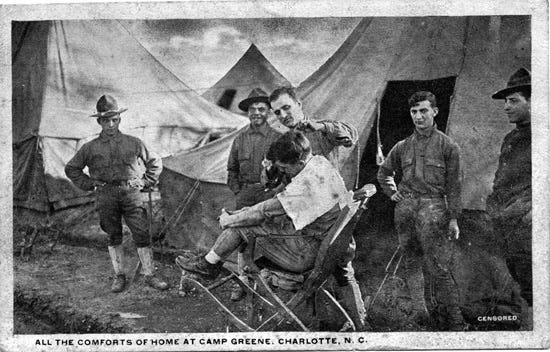
Saturday, September 1st
We finished our cleaning up this morning near eleven o’clock. What a pleasure to see everything clean and well arranged. In the afternoon Capt. Boesch came through and inspected our work. He appeared very much pleased. Hudson is sure of the sergeant’s position. At night I scribbled a few verses as I occasionally do. Have planned to write three poems tomorrow. One to John Charles McNeill, and two, giving two types of peasant women in England and their attitude towards the war. One is too broken-hearted for the loss of her son, killed in battle; the other has forgotten her sorrow in the thoughts of the crowds and the attention she received at his burial. She glories in the fact that she was noticed and sympathized with above those who had lost no son.
Sunday, September 2nd
Today was a grey day to me—a day full of nameless melancholy. A slow wind blew from the north, and it made one shiver involuntarily ever and anon as if autumn were already upon us, with its cold sparkling nights and sober days. I had planned to put in a full day’s writing, but somehow, I couldn’t write. A desolate sense of restlessness kept my mind in a constant state of unrest. I think I had the blues more than usually. Yet the blues aren’t so terrible, after all. For me they make the whole world appear afar off and unreal. In such times as these one can wander throughout the woods philosophizing about life and its vanity at the falling of a leaf or the frightened scampering of a lizard, who, Diogenes-like, has been sleeping in the sun for many an hour.
In the afternoon Pierce Matthews and I took a walk across the fields and through the woods towards Charlotte, following the route of the new car line that is being built out to the camp. As we were crossing a field beyond the creek, we came suddenly upon a watermelon patch. It hardly is worthwhile to mention that we returned to camp guilty of having broken one of the commandments. But carpe diem, y’know.
Monday, September 3rd
Today was spent in drill and the other duties of the camp. At the noon hour I washed my dirty clothes. I may say here that I have realized at last what it means to a woman to have to wash every week for a larger family. I know St. Peter keeps an especial lookout for washer-women.
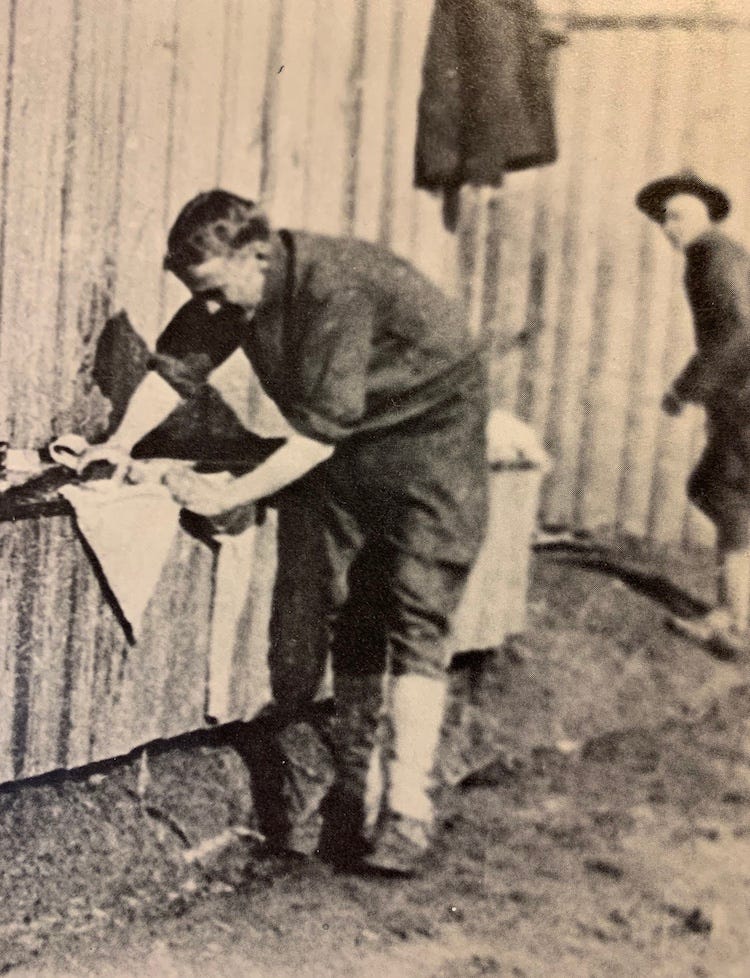
Wednesday, September 5th
I continued work in the Supply room. At night Johnson and I went to town to see a new picture show, “The Slacker.” Before the show began, he and I went down Tryon Street to the publishing house of Stone-Barringer & Co. I wished to purchase a French book. Mr. Stone, the proprietor and publisher, waited on me. He was such a pleasant talker that we were friends in a few minutes and soon we drifted into the subject of our writers — those of the Old North State. Of course, John Charles McNeill’s name was first. Mr. Stone, besides being McNeill’s publisher, was a close friend of his through the poet’s life. He told me many interesting things about McNeill — little things about the man of undoubted genius that made me feel as if I were closely acquainted with him.
He said McNeill did most of his writing at night, smoking great numbers of cigarettes and drinking stimulants the while. No doubt this was the primary cause of his early death. But he lived long enough to let the people know that a true singer had been born in our borders. When will his like come again? I do not know how long Mr. Stone and I would have talked if a customer hadn’t come in. But before leaving, Mr. Stone promised to give me access to his library and aid in any other way possible if I should if I should ever desire to write anything about the authors of our state. After the show, which wasn’t what it had been advertised as being, Johnson and I went back to Camp
Monday Night, Oct. 22nd, now at Camp Sevier (South Carolina)
While I was sitting by my stove tonight, my brother Hugh and William Henry Matthews, a boy from back home, came in for short while. Of course, during our talk we hit upon the universal subject among the soldiers now—war. We talked of the ups and downs, the fights and meeting with dangers we have to undergo before we could see the old farmhouse and our friends far removed. Hugh then mentioned something that set me off at a tangent from the semi-seriousness of our conversation.
A young man in a company next to his had cut his throat today while the other boys were at mess. Taking advantage of their absence he had secured a razor and gone to the company bath house and ended his life. While my brother was telling this, the words of Maupassant kept ringing in my head: “Oh, what a little thing will lose us or save us!” Doubtless a few days ago this unfortunate one was one of the happy home circle and tonight where is he? Poor fool. The fever of living had driven him mad. How dark and barren life must have appeared to him to have brought him to embrace death in such a bloody manner. But again, how cool and restful it must have seemed to his poor, storm-bruised soul as it went slipping into silent eternity where nothing comes to waken one. What did it matter that a great river came up and engulfed him or that a form of a demon danced in the ringing in his ears…Oh, why do those words of the golden orator have to be the truth! “Life is a narrow vale between the cold and barren peaks of two eternities.” When one is so eager for something to satisfy that cruel restlessness inside, why must he smile and pretend he is happy over mere nothings?
Tuesday, November 13th
Took out the limit in life insurance today, $10,000. Perhaps it will help someone, assuredly not me.
Saturday, November 17th
Worked and stood inspection. Early in the morning the whole camp was electrified by the news that every division was quarantined on account of measles and meningitis. Many men have died during the last few weeks. The percentage of loss has been greater than if we had been in the trenches in Flanders. Often as many as six have died in one night. Forgot to mention that on Friday I was appointed by the Captain to attend gas schools. Am thoroughly disgusted with the gas work but suppose that is the only sure prevention again being gassed during an attack. The irritation of the mouthpiece makes me salivate so feely that the training is more of a burden than anything else. Fortunately, the course lasts only five days.
Sunday, November 18th
Another day gone and no mail from home. Several more men reported died at hospital. My friend Dowd and I had planned to take two G.W.C. [Greensboro Women’s College] girls out for an afternoon of automobiling, but alas the quarantine! Wrote some verses for Greenville Daily News. Just songs gathered from the soldiers with the rough edges smoothed away. Strange to say I am finding that every man is an embryonic poet.
Friday, December 7th
Good news! The quarantine is lifted and the little town of Paris, across the valley, on the hill, is ablaze with light and thronged with soldiers. As soon as retreat sounded this afternoon there was a dash to lay away rifles and half the company went pell mell down the road to Paris and from there to Greenville. The greatest delight—innocent delight—of a soldier is a trip to town where a good supper awaits him. He cares not what it may cost if he gets what he wants. If his pleasure stopped at this, all would be well. But it doesn’t. I may mention that 90% of diseases in the army are venereal.
Saturday, December 8th
Was assigned to Hdquts Co. for an indefinite time to do topographical work. As it rained in the forenoon, I was free. Johnson and I decided to go to Greenville. I wished to go to have my watch repaired. We spent there also considerable herbs — (soldiers’ slang for money). Perhaps it is occasionable to mention some of the ridiculous expressions we have among us. The word for money is “herbs.” A soldier never says he is embarrassed. He says, “That whips me” or “That knocks me up.” When one speaks of cutting relations with another he says, “I’m off with you” or “him,” as the case may be. We engineers call ourselves “Boesch’s foot cavalry”—Boesch being the name of our captain. He is a thorough soldier, with a sheer delight in things military. Our band is given the ridiculous name of “Agony Squad.” We understand mess call to be “Come To Beans.” The military police are “Mama’s Pets” or “Methodist Preachers,” taken from the letters M and P which are worn on a strip of cloth around their arms. Drill is called “squad’s righting.” There are many more not so presentable as the foregoing.
Today was officially assigned to sergeant’s tent. Moved in and such a crowd of roughs. Army lives seems to have palled upon them and they ease their feelings by cursing each other and exchanging dirty jokes. And yet they are all good fellows with the highest respect for a lady.
Sunday, December 9th
Went to Paris and around the infantry. Spent more herbs, of course. Came back in the afternoon and began reading a little book of which I had heard a great deal — Goethe’s “Werther.” How tender and melancholy it is! The whole book is charged with a tragedy of human souls, but it is a tragedy that thrills one to the heart of his being.
Monday, December 10th
Went out on topographical work. Sketched over hills and round roads with the cold wind biting in thru my coat. There is a terrible cold spell on here. And opportunely we received our stoves. Tonight I’m writing in my tent as snug as a mouse. Finished “Werther” a few minutes ago. Ah, the sadness of the thing. Poor Werther! Poor Charlotte! Poor everybody! No wonder many young German gentlemen dressed in blue coats and satin-colored breeches were found dead with a copy of Werther in one hand and their lady’s picture in the other.
Copyright 2021, The Paul Green Foundation, All Rights Reserved. Teachers and university faculty are encouraged to assign student readings from this website. Queries about Paul Green’s diaries may be addressed to paulgreenfdn@gmail.com. Please subscribe to this blog and don’t miss a single monthly issue.


